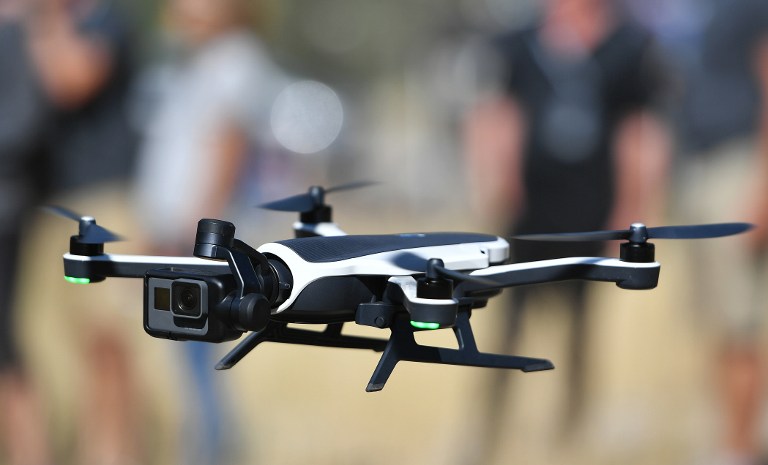
by Glenn Chapman
SQUAW Valley, United States (AFP) — GoPro took to the sky Monday with a much-awaited drone called Karma in the hope of lifting profits which have been battered by competition from all sides.
The launch of the Karma drone, tailored for its first-person-action mini-cameras, and of improved Hero5 cameras comes on the cusp of the important year-end holiday shopping season which last year was a huge disappointment.
In the fourth quarter of 2015, GoPro lost about $34.5 million, as revenue sank some 31 percent from the same period in 2014, to $436.6 million.
The earnings report fell well short of financial analysts’ expectations, sparked a series of downgrades and sent GoPro’s shares plunging as competition from smartphone makers turned out to be more threatening than forecast.
This means the Karma launch, which comes alongside new Hero5 cameras and a cloud-based service for storing, editing and sharing video, is instrumental for a revival of the company’s fortunes, analysts said.
“GoPro’s Karma has potential to gain decent traction,” Colin Snow, founder of Skylogic Research, told Bloomberg News, “if it’s priced under $1,000 and has all the capabilities of existing drones in that price category.”
Karma drones will be priced at $799 when they become available starting on October 23.
The drones boast simple joystick and touch-screen controls, and fold easily into a padded backpack that is provided.
An image-stabilizing grip in the drone is designed to hold Hero cameras, which are not included in the backpack.
“We transformed GoPro into an end-to-end storytelling solution,” company chief Nick Woodman said after making a rock-star entrance at a media event in a tent at the Squaw Valley ski area where the 1960 Winter Olympic Games were held.
– ‘Host of problems’ –
GoPro’s much anticipated entry into the drone market comes as the California-based company strives to distinguish itself in an increasingly competitive market for mini-cameras that can be used to capture adventures or sports from personal perspectives.
Chinese manufacturer SZ DJI Technology has been dominating the drone market, where many smaller companies producing cheaper drones are also pushing for market share.
Skylogic’s Snow said given hiccups previously seen in the drone market, GoPro’s Karma may experience teething issues.
“Almost no drone we’ve ever seen comes out without a host of problems,” he said.
The new Hero5 Black and Hero5 Session cameras, which boast features such as multi-language voice control and ultra-high-definition image quality, will be available on October 2 with pricing of $399 and $299, respectively.
Karma drones bundled with Hero5 cameras will be priced at $1,099 or $999, depending on whether a Black or Session model is selected.
– Action in the cloud –
The company is setting out to build its adventure-oriented community, and create a steady revenue stream, with a GoPro Plus subscription service that uploads imagery to the internet cloud and provides simple tools for editing and sharing from smartphones or desktop computers.
GoPro Plus will cost $4.99 per month after it becomes available to the public on October 2.
Smartphone applications were crafted to let people edit or even remotely control cameras from Apple or Android powered handsets.
Woodman said GoPro was packing more into its cameras, and making it easy for users to quickly compose story vignettes to share, whether doing adventure sports or enjoying beautiful moments.
People at the gathering took to the mountain at Squaw Valley to try flying Karma drones and put new GoPro Hero cameras through paces zip-lining, trampoline bouncing, horseback riding, rock climbing and more.
– Outside developers –
GoPro early this year launched a program to collaborate with outside developers to make it easy to use the company’s mini cameras with apps or synch them with other devices.
The company also hired away an Apple veteran to become vice president of the GoPro design team.
GoPro became an early hit with extreme sports enthusiasts who used the mini-cameras to film their exploits, and went on to win over teens and young adults interested in sharing videos on YouTube and social networks.
Woodman said on Monday that more than 20 million GoPro cameras have “captured the incredible.”
The company went public in June 2014 with shares initially priced at $24 that soared in subsequent months, more than tripling in value at one point.
But the stock price slid last year as investors worried about the company’s growth prospects and the possible saturation of an increasingly competitive market.
GoPro shares were up about 2.3 percent to $15.31 at the close of trading on the Nasdaq exchange on Monday.
gc/oh/jh/sg
© 1994-2016 Agence France-Presse







